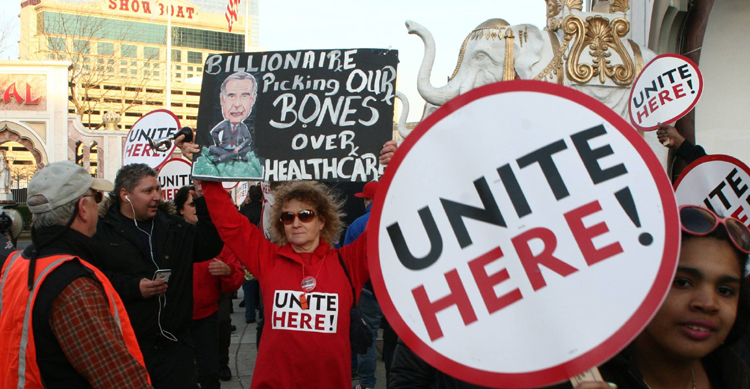A challenge by a union attempting to restore the pension and health benefits of upwards of 1,000 workers at the Atlantic City Trump Taj Mahal casino was rejected Tuesday by the U.S. Supreme Court.
Ending the ongoing battle between Unite Here Local 54, which has vowed to continue picketing in an effort to deter business from the casino, and billionaire business magnate Carl Icahn, whose argument is that the benefits are unaffordable and extortionate, has even eluded the nation’s highest court.
Supreme Court justices let stand previous rulings by lower courts in favor of the former Trump Entertainment Resorts, which was run by Donald Trump who is campaigning for the presidency of the United States. In 2014, the company filed for bankruptcy protection and the cost savings it sought were imposed by a federal bankruptcy judge. They included ending pension and health insurance benefits for unionized workers. The appeal by the union urged the high court to review and reverse the lower court’s ruling, making the argument that even if the labor laws expire during a bankruptcy, they still call for preserving collective bargaining agreements.
Workers were given cash stipends by the company to purchase health insurance through the Affordable Care Act, but many of them say the stipend hasn’t been enough to purchase coverage. The bitter labor battle began after Trump had already disengaged from the company, with the exception of a deal permitting the use of his name that gave him a 10 percent stake, a stake which was dissolved in bankruptcy court.
It was indicated by the union that the casino, now owned by Carl Icahn, will continue to be picketed. Al Wallinger, a bellman at the casino who has held the position since its opening in 1990, said, “Just because courts have OK’d Icahn seizing our health insurance, pension and paid breaks doesn’t mean that this company will be able to rebuild its business while workers are still without health care, and protesting in the streets,” according to the Associated Press. A strike against Taj Mahal has been authorized by Local 54, but so far hasn’t walked off the job.
Icahn, who in March took control of the casino and had kept it afloat during its bankruptcy, insisted that instead of putting the job security of its workers first, the union has prioritized its own profits. Icahn told The Associated Press, “Even the union will not deny that without our capital when it was sorely needed, the Taj Mahal would not exist today,” and, “It is amazing to me that the union is still fighting us. It’s as if they’re hoping to see us close.” Icahn has said repeatedly that if the lower bankruptcy court’s ruling canceling the benefits were restored by a higher court he would withdraw his financial support and shut the casino down. He says that considering the current situation in Atlantic City, the benefits that Taj Mahal workers were receiving are not feasible. In 2014, four of the resort city’s 12 casinos shut down, aided by competition from casinos in neighboring states. Fifteen million is being invested by Icahn on immediate upgrades at the casino in its effort to get back the business it lost throughout the bankruptcy.
Local 54 has yet to issue a press release regarding the Supreme Court’s decision.



